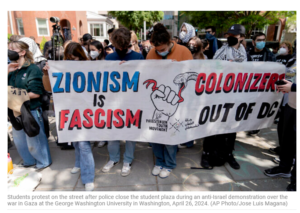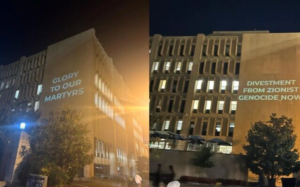One of the most glaring and outrageous features of the anti-Israel demonstrations and encampments on university campuses over the last year has been the effort — at times successful — to exclude Jewish students from campus space. There is no more fundamental curtailment of students’ right to free speech than preventing them from attending class or moving freely around the campus.
And yet, in its review yesterday of how the Israel-Hamas war and the accompanying campus disturbances have impacted students’ right to free speech, the Associated Press spared not one word for the most basic withdrawal of free speech rights: the right to attend class and be present in any campus space which all enrolled students are supposed to be entitled to use (“A year into the Israel-Hamas war, students say a chill on free speech has reached college classrooms“).
While the article alleged that students are afraid to speak freely on the Israel-Hamas conflict in their classrooms, and also cited complaints from anti-Israel students that new regulations are harming their protests, at no point did AP’s Collin Binkley and Michael Melia provide any hint that those very same protests often quash Jewish students’ most fundamental right of free speech: blocking them from reach their classes and other public spaces on campus.Thus, the article quotes Mark Yudof, a former president of the University of California system: “The faculty are at odds with each other. The student body is at odds with each other. There’s a war of ideologies going on.”
Yes, there is. But only one side literally prevented the other side from reaching their classes — and a University of California school was a prime proving ground for the revocation of Jewish students’ rights of free movement, and therefore free speech.
Thus, as AP itself not long ago reported (“UCLA can’t allow protesters to block Jewish students from campus, judge rules“):
A federal judge ruled Tuesday that the University of California, Los Angeles, cannot allow pro-Palestinian protesters to block Jewish students from accessing classes and other parts of campus.. . .
U.S. District Judge Mark Scarsi’s ruling came in a lawsuit filed in June by three Jewish students at UCLA. The students alleged that they experienced discrimination on campus during the protest because of their faith and that UCLA failed to ensure access to campus for all Jewish students.
“In the year 2024, in the United States of America, in the State of California, in the City of Los Angeles, Jewish students were excluded from portions of the UCLA campus because they refused to denounce their faith.” Scarsi wrote.
Similarly, an account in The Atlantic about the situation at Stanford alleged: “Indeed, two parties at Stanford were reported to the university this fall for allegedly making people say ‘Fuck Israel’ or ‘Free Palestine’ to get in the door.”
On the East Coast, the situation is not any better. The Jewish Telegraphic Agency reported (“Columbia task force reports ‘crushing’ discrimination against Jews and Israelis“):
Jewish students at Columbia University have been driven out of their dorm rooms, chased off campus, compelled to hide their Jewish identity, ostracized by their peers and denigrated by faculty, according to a report released Friday by the university’s Task Force on Antisemitism.
Likewise, at MIT, Jewish students were “physically blocked from moving through the anti-Israel crowd through the main MIT lobby.”
In the April 26, 2024 AP photograph above, protesters at GWU carried a sign warning Zionists (“colonizers”) to get out of DC. (It’s not enough, apparently, that they merely vacate the DC campus which featured prominently in Binkley’s story.)
Indeed, there was no question about the threatening nature of the rhetoric targeting Jewish students at a school event in a kosher deli near Baruch College: “You ain’t going home tonight” and “Dogs off campus.” Nor was there any ambiguity about the slogan outside a CUNY Hillel. As Tablet reported:
[CUNY English teacher and Hillel director Ilya] Bratman says the tenor of the violence worsened over the summer, with demonstrators becoming more frustrated and volatile, last week marching outside Hillel with a white sign painted in red letters reading: “Bring the war home,” illustrated with a machine gun.
The article supplied no indication that Jewish students are regularly subjected to explicit, blatant abuse — indisputable threats by any definition.
In failing to report on the barring of Jewish students from their academic and social lives on campus, the AP subjected them to a second erasure.
And in obscuring the open threats to Jewish life and limb on campus, AP risks empowering the illiberal forces seeking to rid campus spaces of Jewish students and their voices.
A note appended to the bottom of Binkley’s article explains:
The Associated Press’ education coverage receives financial support from multiple private foundations. AP is solely responsible for all content. Find AP’s standards for working with philanthropies, a list of supporters and funded coverage areas at AP.org.
This article was originally published on CAMERA.org.



